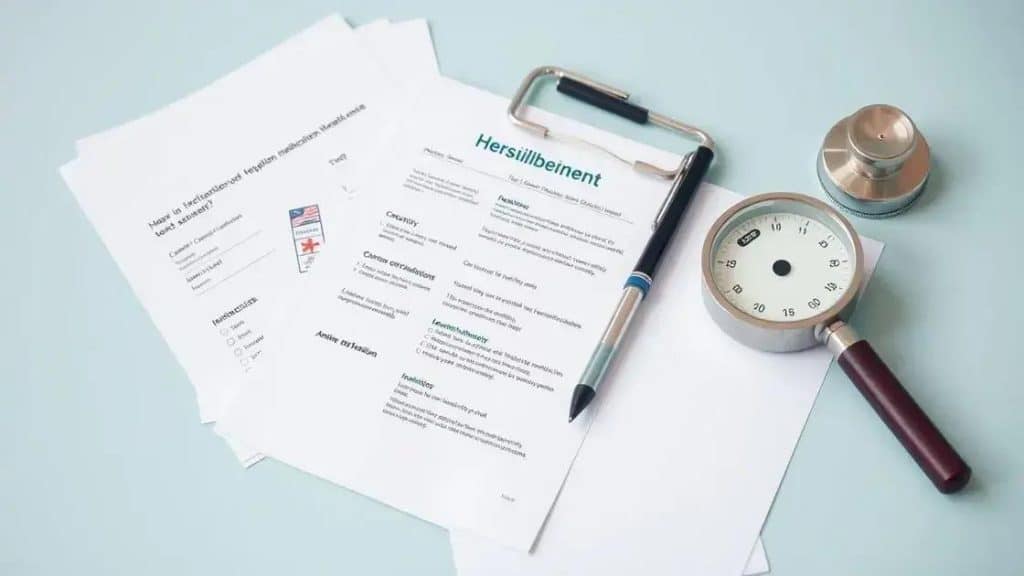Social Security disability application checklist: essential steps

The Social Security disability application checklist outlines essential steps, documents, and tips to help ensure a successful application process for individuals seeking disability benefits.
Social Security disability application checklist can feel overwhelming, but don’t worry! This guide breaks down the essential steps to help you navigate the process smoothly. Are you ready to dive in?
Understanding Social Security disability benefits
Understanding Social Security disability benefits is crucial for individuals who may not be able to work due to a medical condition. These benefits are designed to provide financial support to those in need.
What are Social Security disability benefits?
Social Security disability benefits offer monthly payments to individuals who have a qualifying disability. To receive these benefits, you must meet specific eligibility criteria. These include:
- Having a medical condition that significantly limits your ability to work.
- Having earned enough work credits through your employment history.
- Meeting the Social Security Administration (SSA) definition of disability.
The process can seem complex, but understanding the key terms and requirements can simplify it.
Eligibility criteria explained
Your eligibility for Social Security disability benefits revolves around your work history and the nature of your disability. Generally, you need to have worked for a certain amount of time and paid into the Social Security system. Your medical condition must also be listed in the SSA’s Blue Book or be comparable to a listed condition.
Once your application is submitted, the SSA will review your work history and medical information. It may take several months to get a decision, and not all applications are approved initially.
Types of Social Security disability benefits
There are two main types of disability benefits provided by the SSA:
- Social Security Disability Insurance (SSDI) – For those who have sufficient work history.
- Supplemental Security Income (SSI) – For low-income individuals with disabilities, regardless of work history.
Both types of benefits are essential to support individuals and families during challenging times.
In understanding Social Security disability benefits, it’s vital to know that the system is in place to help those who desperately need assistance. Having this knowledge empowers you to navigate the application process with confidence.
Key documents needed for your application

When applying for Social Security disability benefits, having the right documents is essential. These documents help support your claim and demonstrate your eligibility for assistance.
Required documents overview
You will need several key documents to complete your application. These documents include:
- Medical records – Essential for proof of your disability and treatment history.
- Work history – A detailed account of your employment background.
- Financial information – Documentation of your income and resources.
Not all documents may be required for every applicant, but having these on hand can speed up the process.
Detailed breakdown of key documents
The first necessary document is your medical records. These records should outline your diagnosis, treatment, and any ongoing issues that affect your ability to work. Also, consider including notes from healthcare providers.
Next, you’ll need a complete work history. This includes the names and addresses of previous employers, dates of employment, and job descriptions. Ensuring accuracy here is crucial.
Financial documents are also vital. Provide bank statements, tax returns, and proof of any income sources. This information helps establish your financial need for benefits.
Finally, be prepared to submit your Social Security number and any other identification documents as requested. These steps are necessary for processing your application and ensuring a smooth experience.
Common mistakes to avoid when applying
Applying for Social Security disability benefits can be a daunting task, and many applicants make mistakes that delay or jeopardize their claims. Recognizing these common pitfalls can help you navigate the process more successfully.
Incomplete applications
One of the most frequent mistakes is submitting an incomplete application. Ensure that all sections are filled out accurately. Double-check the information you provide, as missing details can lead to delays.
Neglecting medical documentation
Another critical error is failing to include adequate medical documentation. Your application needs to show evidence of your disability. Include all relevant medical records, test results, and treatment plans from your healthcare providers.
- Obtain updated records that reflect your current condition.
- Ensure your doctors support your claim with detailed notes.
- Avoid using general claims of disability; focus on specifics.
Additionally, many individuals underestimate the importance of a thorough work history. Be detailed about your previous jobs, including job descriptions and responsibilities. Failing to do so may weaken your application.
Not following up
After you submit your application, it’s important to follow up regularly. Many applicants make the mistake of not checking the status of their claims. A lack of communication can lead to unnecessary delays.
Stay informed about your application’s progress, and be proactive in responding to any requests for additional information from the SSA.
Understanding these common mistakes to avoid when applying for Social Security disability benefits can greatly improve your chances of approval. By being thorough and attentive, you enhance your application’s likelihood of success.
Tips for a successful application process

To ensure a successful application for Social Security disability benefits, it’s important to follow specific tips that can enhance your chances of approval. Applying correctly can make a significant difference in the outcome.
Gather all necessary documentation
Before you start filling out your application, make sure to gather all essential documents. This includes medical records, work history, and financial details. Having everything organized will allow you to complete your application accurately.
Be detailed and complete
When providing information, be as detailed as possible. Explain your condition, its effects on your daily living, and your work capabilities. Use clear language to describe your symptoms and how they interfere with your ability to work.
- List all medications you take and their side effects.
- Include names and contact information for all your healthcare providers.
- Keep track of any treatments or therapies you have undergone.
Completeness helps the SSA assess your condition more effectively.
Follow the timelines
Pay attention to any deadlines associated with your application. Make sure to submit your documents and information on time to avoid delays in processing. Tracking your application’s status after submission is also crucial.
Many applicants benefit from staying in touch with the SSA. If they request additional information, respond promptly and accurately to keep your application moving smoothly.
Seek help if needed
If you feel overwhelmed, don’t hesitate to seek assistance. Consider consulting with professionals who specialize in disability claims. They can offer guidance and help ensure your application is complete and accurate.
Applying for Social Security disability benefits doesn’t have to be a stressful experience. Following these tips can make the process easier and improve your chances of a favorable result.
FAQ – Frequently Asked Questions about Social Security Disability Benefits
What documents do I need for my application?
You will need medical records, work history, and financial information to support your application for Social Security disability benefits.
How long does the application process take?
The application process can take several months. It’s important to check your application status regularly and respond promptly to any requests from the SSA.
Can I apply for benefits if I’ve never worked?
Yes, you may qualify for Supplemental Security Income (SSI) if you have a disability and meet the income and resource limits, even if you haven’t worked.
What should I do if my application is denied?
If your application is denied, you can appeal the decision. It’s helpful to understand the reason for the denial and gather additional information to support your appeal.





